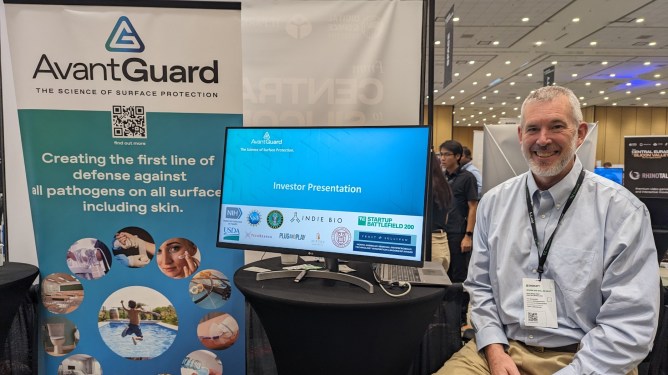
AvantGuard, a company that has been making waves in the biotech and health sectors, is redefining the way we think about chlorine. While most people associate chlorine with pool cleaning and stain removal, AvantGuard sees it as a rechargeable chemical with the potential to become an ultimate surface protectant.
A Brief History of AvantGuard
AvantGuard was founded in 2018 under the name Halomine and spun out of Cornell University. The company is working with N-halamines, an organic compound that links nitrogen with chlorine, enabling antibacterial capabilities. When put together, it essentially creates a ‘microbial death.’ AvantGuard has licensed N-halamine technology from both Cornell and Auburn University, where it has been under development for 30 years.
CEO Edward ‘Ted’ Eveleth’s Vision
According to AvantGuard CEO Edward ‘Ted’ Eveleth, who joined the company in 2019, what sets them apart from traditional chlorine-based disinfectants is their polymer version. This enables them to do "all sorts of cool and interesting things" with halamines, such as sticking it on a surface or adding other functionalities that prevent proteins from sticking to it. This means they can make any surface an antimicrobial surface.
The Polymer Version: A Game-Changer
AvantGuard’s polymer version of N-halamines has the potential to revolutionize various industries, including water treatment, medical applications, and even consumer products. Some possible uses for this technology include:
- Water Treatment: AvantGuard’s polymer can be used to create antimicrobial coatings that prevent bacterial growth in water treatment plants.
- Medical Applications: The company is working on creating an antifungal product using their polymer version of N-halamines, which could have a significant impact on wound healing and preventing infections.
- Consumer Products: AvantGuard’s technology can be used to create antimicrobial coatings for various consumer products, such as textiles, plastics, and medical devices.
Initial Product: 247
AvantGuard’s initial product is a spray-on antimicrobial coating called 247. This coating sprays on surfaces, dries transparently, and binds chlorine to the surface, preventing it from washing off easily. The company claims that when pathogens land on the surface treated with 247, they are killed.
EPA Testing
According to AvantGuard’s CEO, Ted Eveleth, their product has passed EPA testing for gram-negative, gram-positive bacteria, and enveloped viruses. They claim a 99.9% reduction in microbial growth within two hours as a residual antimicrobial coating.
Regulatory Approval and Funding
AvantGuard expects regulatory approval for its 247 product in early 2024. The company has raised over $8 million in grants from the National Institutes of Health, National Science Foundation, and others, as well as $4 million in equity funding.
Partnerships and Future Plans
AvantGuard is working on a strategic partnership with a medical device company to create an antifungal product. The company has plans to formalize one of its patents this month and begin raising another round of funding at the end of the year.
Conclusion
AvantGuard’s innovative use of N-halamines has the potential to revolutionize various industries, from water treatment to medical applications. With its initial product, 247, showing promise in EPA testing, the company is poised to make a significant impact on the biotech and health sectors.






